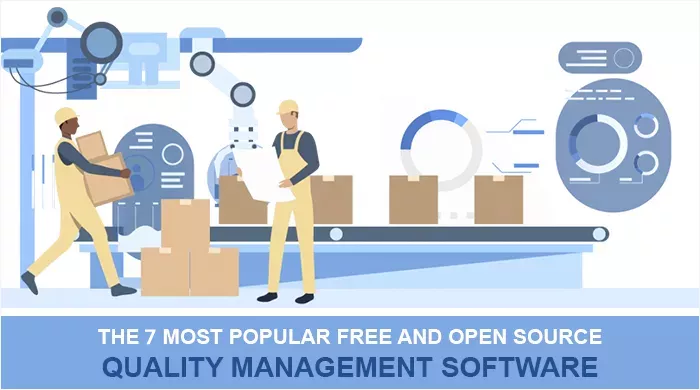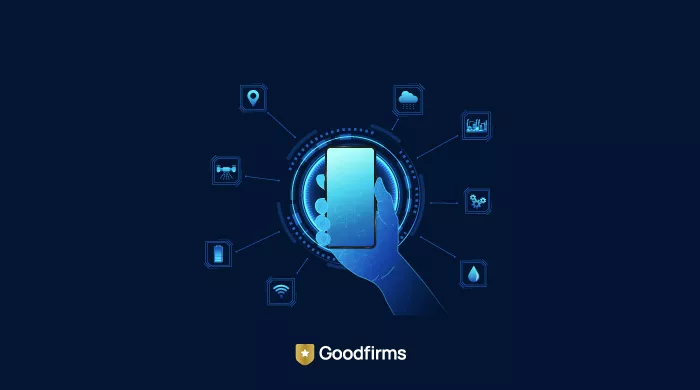Best Quality Management Software
Achieving required Industry standards, regulatory approvals, and quality certifications are challenges that can be mitigated by deploying integrated Quality Management Software. A robust quality management system drives continuous improvement in your processes and ensures compliance for a clear audit trail. The QMS software provides your quality control team with all the tools required in case of any required corrective action or root cause analyses to identify errors. QMS system has features such as Audit Management, Complaint Management, Equipment Management, Risk Management, and Supplier Quality Control, Training Management. Goodfirms has curated the list of best Quality Management platforms that can lead your company to obtain certifications such as ISO 9001:2008 or FDA/EU certificates. Check out the Goodfirms list of QMS software here.
List of Best Quality Management System | Best QMS Software
-
uizap is a developer-first bug reporting and session capture tool for modern web apps. With a single click, anyone on your team—QA, support, product, or beta users—can submit a rich, reproducible report: ... read more about UI Zap
Entry Level PriceContact vendorFree Trial30 DaysPricing TypePer User10% in Quality Management SoftwareFeatures
- Defect Tracking
Key Details
Industries
-
Computer-software
Licensing & Deployment
-
Proprietary
-
Cloud Hosted
-
Web-based
Support
- Email
- Chat
-
Support Days
Training
-
Documentation
Packages
Pricing Type
-
Per User
Preferred Currency
-
USD ($)
Free Version
-
Yes
Free Trial
-
30 Days Trial
Payment Frequency
-
Monthly Payment
-
Annual Subscription
Integration
Integrated With
- Jira
- slack
- GitHub
- Asana
- linear
- Clickup
-
CertCrowd delivers a modern Quality Management System for ISO 9001. Build and run your QMS with guided workflows, ready-made procedures and controlled documents (versioning, approval, training). Capture nonconformances and corrective actions (NCR/CAPA), ... read more about CertCrowd
Entry Level PriceContact vendorFree TrialN/APricing TypePer User50% in Quality Management SoftwareFeatures
- Audit Management
- Complaint Management
- Document Control
- Maintenance Management
- Risk Management
- Supplier Quality Control
- Training Management
Key Details
Industries
-
Building-materials
-
Business-supplies-equipment
-
Chemicals
-
Computer-software
-
Construction
-
Electrical-electronic-manufacturing
-
Facilities-services
-
Financial-services
-
Import-export
-
Management-consulting
-
Pharmaceuticals
-
Utilities
Licensing & Deployment
-
Proprietary
-
Cloud Hosted
-
Web-based
Support
- Email
- Chat
- Phone
-
24x7 Support
Training
-
Webinar
-
In-person
-
Documentation
Knowledge Base
-
Help Docs
Packages
Pricing Type
-
Per User
Preferred Currency
-
USD ($)
Free Version
-
Yes
Payment Frequency
-
Annual Subscription
Integration
Integrated With
- Microsoft 365
-
Jadian is a global software and services company specializing in compliance, audits, inspections, field operations, and risk management solutions. Their products include tools for enterprise quality management, customizable audit management, and mobile-friendly ... read more about Jadian
Entry Level PriceContact vendorFree TrialN/APricing TypePer User40% in Quality Management SoftwareFeatures
- Audit Management
- Document Control
- Supplier Quality Control
Key Details
Industries
-
Accounting
-
Food-production
Licensing & Deployment
-
Proprietary
-
Cloud Hosted
-
Web-based
Support
- Email
- Chat
- Phone
-
24x7 Support
Knowledge Base
-
Food Safety Software
-
Filed Service Management Softwrae
-
Compliance Management Software
-
Quality Management Softwrae
Packages
Pricing Type
-
Per User
Preferred Currency
-
USD ($)
Free Version
-
Yes
Payment Frequency
-
Monthly Payment
-
Annual Subscription
-
Quote Based
Integration
Integrated With
- jadian
-
MESH Works provides a complete quality management system for manufacturers of metal components. It supports APQP activities with customizable templates for FMEAs, control plans, and other important documents. All engineering and quality ... read more about MESH Works
Entry Level PriceContact vendorFree TrialN/APricing TypeUsage Based20% in Quality Management SoftwareFeatures
- Audit Management
- Complaint Management
- Defect Tracking
- Equipment Management
- Maintenance Management
Key Details
Industries
-
Automotive
-
Building-materials
-
Business-supplies-equipment
-
Construction
-
Consumer-electronics
-
Electrical-electronic-manufacturing
-
Logistics-supply-chain
-
Machinery
-
Maritime
-
Mechanical-or-industrial-engineering
Licensing & Deployment
-
Proprietary
-
Cloud Hosted
-
Web-based
-
iPhone/iPad
-
Android
-
Windows
-
Mac
Support
- Email
- Chat
-
24x7 Support
Packages
Pricing Type
-
Usage Based
Preferred Currency
-
USD ($)
Free Version
-
Yes
Payment Frequency
-
Quote Based
-
QualityPro is a powerful, cloud-based 𝗤𝘂𝗮𝗹𝗶𝘁𝘆 𝗠𝗮𝗻𝗮𝗴𝗲𝗺𝗲𝗻𝘁 𝗦𝗼𝗳𝘁𝘄𝗮𝗿𝗲 (𝗤𝗠𝗦) designed to help businesses of all sizes and sectors improve product quality, enhance compliance, manage risk, and drive continuous improvement across their operations. ... read more about QualityPro by TecWork
Entry Level PriceContact vendorFree TrialN/APricing TypeContact Vendor100% in Quality Management SoftwareFeatures
- Audit Management
- Complaint Management
- Defect Tracking
- Document Control
- Equipment Management
- Risk Management
- Training Management
Key Details
Industries
-
Automotive
-
Biotechnology
-
Chemicals
-
Construction
-
Consumer-electronics
-
Consumer-goods
-
Dairy
-
Electrical-electronic-manufacturing
-
Food-beverages
-
Information-technology-services
-
Oil-energy
Licensing & Deployment
-
Proprietary
-
Cloud Hosted
-
Web-based
Support
- Email
- Chat
- Phone
-
24x7 Support
Training
-
Webinar
-
In-person
-
Documentation
Knowledge Base
-
Help Guides
-
Videos
-
Blogs
Packages
Pricing Type
-
Contact Vendor
Preferred Currency
-
USD ($)
Free Version
-
No
Payment Frequency
-
Annual Subscription
Why Trust Goodfirms
Goodfirms is the world’s leading reviews and ratings company featuring 110,000+ tech companies from across the globe, complete with 80,000+ humanly vetted client reviews, detailed portfolios, hourly rates, employee strength, and more to help you choose your perfect tech partner.
Humanly-Vetted Client Reviews
Our researchers have personally vouched for the authenticity of 80,000+ client reviews by speaking directly with clients, cross-checking project details, timelines, and results to ensure 100% credibility.
Data-Driven Rankings
Data powers our company listings. Every company listed is evaluated based on its expertise, experience, market presence, reviews, and client satisfaction rate, which helps buyers confidently choose the right tech partner.
Global Trust & Recognition
Goodfirms is trusted by 110,000+ businesses in 160+ countries to connect with reliable tech partners. Our reputation is built on 80,000+ verified reviews and rankings you can trust.
Transparency In Detail
From verified client reviews and portfolio highlights to service focus and pricing, Goodfirms provides a 360-degree view of every company, helping 2+ million monthly users find the perfect tech partner.
Trending insights from Goodfirms
Valuable insights from top experts accelerate decision-making.

The 7 Most Popular Free and Open Source Quality Management Software
Increase operational efficiency, reduce defects, and ensure compliance with the industry standards using the best free and open source quality management... ... Read research article

Most Popular AI Automation Tools for Small Businesses
The most popular AI automation tools for small businesses help automate repetitive and operational tasks, focusing on high-impact strategic initiatives. ... Read research article

On-Device Intelligence: How Apple’s Core ML and Google’s ML Kit Redefine the Future of Platform-Specific Apps
Apple’s Core ML and Google’s ML Kit progresses with on-device intelligence. A deep dive into their high-performance, platform-specific AI. ... Read research article





